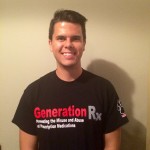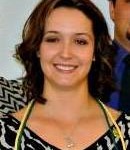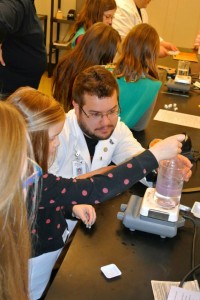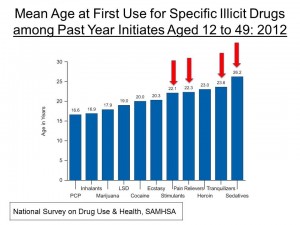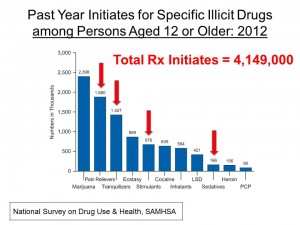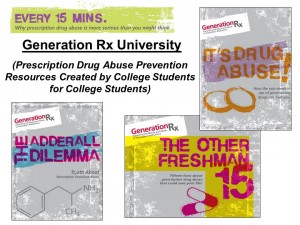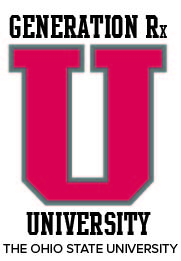
The University of New Mexico’s Generation Rx Chapter recently won the national APhA Generation Rx Award to recognize their outstanding work in prescription drug abuse prevention and education. To find out what has made their program so successful, we interviewed a group of students from UNM’s chapter of Generation Rx.
Here is what they had to say about Generation Rx at their university:
The students at the University of New Mexico have been recognized nationally for their work in prescription drug abuse prevention. What has made your school so successful in its Generation Rx projects? What advice can you offer to other colleges to help prevent the misuse and abuse of prescription medications?
The Generation Rx program at the University of New Mexico College of Pharmacy has been successful because our entire state is behind this initiative. As a student body, we have made important connections statewide. Much of our student body are residents of New Mexico, and enjoy returning their hometowns to talk with their previous teachers, coaches, principals and guidance counselors about this issue and how we can help educate their students. As a result, this spurs excitement among the schools and enthusiastically offers the opportunity for us to get into the classrooms and present. This has been an extremely successful approach.
 In fact, we have been able to deliver our message in 28 out of the 33 counties in New Mexico. We also have a very dedicated core group of students who are willing to travel statewide to present. Use your School/College of Pharmacy resources! Use your people resources, like students, faculty, staff and administration. They have connections in the community that reach far beyond what only students have. We have established long-lasting relationships with local and statewide schools just by talking to the people in our own backyard. If there are more than 1 School/College of pharmacy in the state, join forces to make a greater impact. Utilize the resources provided by Cardinal Health and the Ohio State University to develop your own personalized presentation specific to your community. Send us an email! We are more than happy to provide you with tools or share stories of how we operate with everyone in our community. We would love to help you develop your program any way we can.
In fact, we have been able to deliver our message in 28 out of the 33 counties in New Mexico. We also have a very dedicated core group of students who are willing to travel statewide to present. Use your School/College of Pharmacy resources! Use your people resources, like students, faculty, staff and administration. They have connections in the community that reach far beyond what only students have. We have established long-lasting relationships with local and statewide schools just by talking to the people in our own backyard. If there are more than 1 School/College of pharmacy in the state, join forces to make a greater impact. Utilize the resources provided by Cardinal Health and the Ohio State University to develop your own personalized presentation specific to your community. Send us an email! We are more than happy to provide you with tools or share stories of how we operate with everyone in our community. We would love to help you develop your program any way we can.
If you were starting Generation Rx activities at another school, what is the first thing you would do?
- Enlist a dedicated core group of students who are passionate about this issue.
- Use a “train the trainer” model to get new students trained on the various Generation Rx presentations available.
- Ask the student body, faculty, staff and administration if they are involved with an outside organization, or have a venue where this information would be well received (high school alma maters, youth groups, sports teams, Girl/Boy Scout troops, Rotary clubs, etc.).
- Give a presentation!
What does Generation Rx mean to you?
An initiative designed to educate the public about the dangers of prescription drug abuse and misuse. The “pill taking” generation affects everyone and spans all age groups. Through this free education and prevention program, this initiative can hopefully prevent one more overdose death, rescue one more person from addiction, and, save one more family from suffering a tragic loss.
 What is the most memorable experience you have had while teaching others about prescription drug abuse?
What is the most memorable experience you have had while teaching others about prescription drug abuse?
Recently we were able to present to our first group of youth in recovery. Of all the presentations we have given, this one has truly been the most impactful and memorable for me. To hear the stories of these teenagers’ past drug use and lifestyles they have had to overcome was extremely moving. We talked about why they felt the way they did when they were using, why they felt cravings, and why their bodies felt the way they did when they were in withdrawal. This was incredibly impactful for me, and I hope they will remember what we taught them as they bravely start their recovery. It was at that moment that I felt like I was making a difference.
Why do college students need to be concerned about medication safety?
Medications can be safe and effective when taken the right way. But when they are abused, or when medication is shared, the consequences can be dire. We hear over and again things like ““I know this won’t hurt me because I know how much to take,” and “My friend takes this and nothing bad happens to them.” Medications are typically dosed based on the severity of the disease and the patient’s height and weight. In college, oftentimes medications are shared, in an attempt to use them for studying or just to party. College students may have no knowledge of what the drug will do to them and they could have a serious allergic reaction, experience dangerous side effects, or, worse, die from an accidental overdose. No one is too strong or too smart to beat a drug if it is abused. As student pharmacists, we have the duty to stop the spread of misinformation, and ensure safety to our communities.
If you could tell everyone only one thing about prescription drug abuse, what would it be? Why?
DON’T EVEN GET STARTED! No one is strong enough, famous enough, or smart enough to be “invincible” to this problem. Prescription medications improve the lives of patients every day when they are taken as prescribed and appropriate, but they have the potential to be just as dangerous as illegal drugs when abused and misused.


